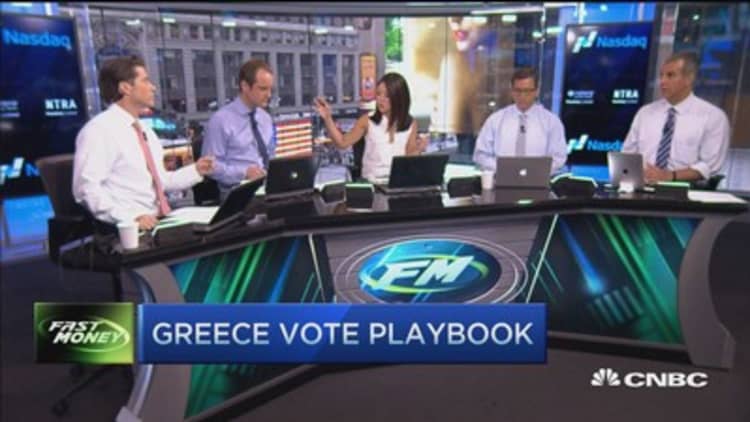Foreign exchange strategists advise dumping the euro following Greece's landmark referendum on Sunday, regardless of the outcome.
A "no" vote will produce the messiest scenario, but a "yes" vote is just as complicated because it would deepen the political crisis before alleviating the financial one, explains Kathy Lien, managing director at BK Asset Management.
Greek citizens go to the polls on Sunday to vote on whether to accept the bailout terms demanded by creditors, with the latest opinion polls suggesting the outcome is too close to call. In the event the majority of Greeks vote "no", the Greek financial system would collapse, putting into question the unity of the euro zone, says Lien.

"Even if a Grexit is long term positive for the monetary union, in the short term, the fear of a Grexit could lead to a multi-day decline in the EUR/USD," Lien said, predicting the currency pair could plunge to below 1.08.
"While [Greece] Prime Minister Tsipras will try to use this as leverage to negotiate a new deal with creditors, too many bridges have been burned and in all likelihood there will be no deal and Greece will be pushed out of the euro," she said.
Under this outcome, Lien looks to sell the euro with an eventual target of $1.05 – 5 percent below current levels.
If Greek people vote to accept the terms of European creditors, this will likely spur a knee-jerk reaction in the single currency followed by a decline, according to Lien. A "yes" vote is set to usher in a period of heightened political uncertainty given both the Greek prime minister Alexis Tspiras and Finance Minister Yanis Varoufakis have pledged to resign under such a scenario.
"Of course given the track record of the Greek government, we would not be surprised if Tsipras decided to remain in office for the sake of executing the people's demands by negotiating a new deal," said Lien.
"The question then becomes whether or not Greece and its creditors can agree to a new deal before July 20th, when Greece owes the ECB 3.5 billion euros," she added.
In such a scenario, Lien says she would be looking to sell the euro between 1.1350 and 1.1550.
Read MoreJulian Robertson: Euro could easily go below parity
Nizam Idris, head of foreign-exchange and fixed-income strategy at Macquarie Bank mirrored this view.
"In both cases, I would want to sell the euro," Idris said. "If no, it will be messy and questions on the sustainability of the European Union will be raised," he said. ""If yes, we'll probably see a knee jerk reaction, and I'd want to sell on the rally."
Idris says while a "yes" vote would be encouraging, it may shift investors' focus back to the macroeconomic fundamentals of the euro zone, which are less than optimal.
"If the market was to go back to look a fundamentals, I don't see a reason for the euro to strengthen from here," said Idris, who expects the euro to end the year at $1.05.
While the euro has declined over 8 percent against the greenback so far this year, the bulk of its losses occurred in the first three months of 2015. The single currency has proved broadly resilient in spite of the unfolding Greek crisis, slipping just 0.5 percent over the past month.


